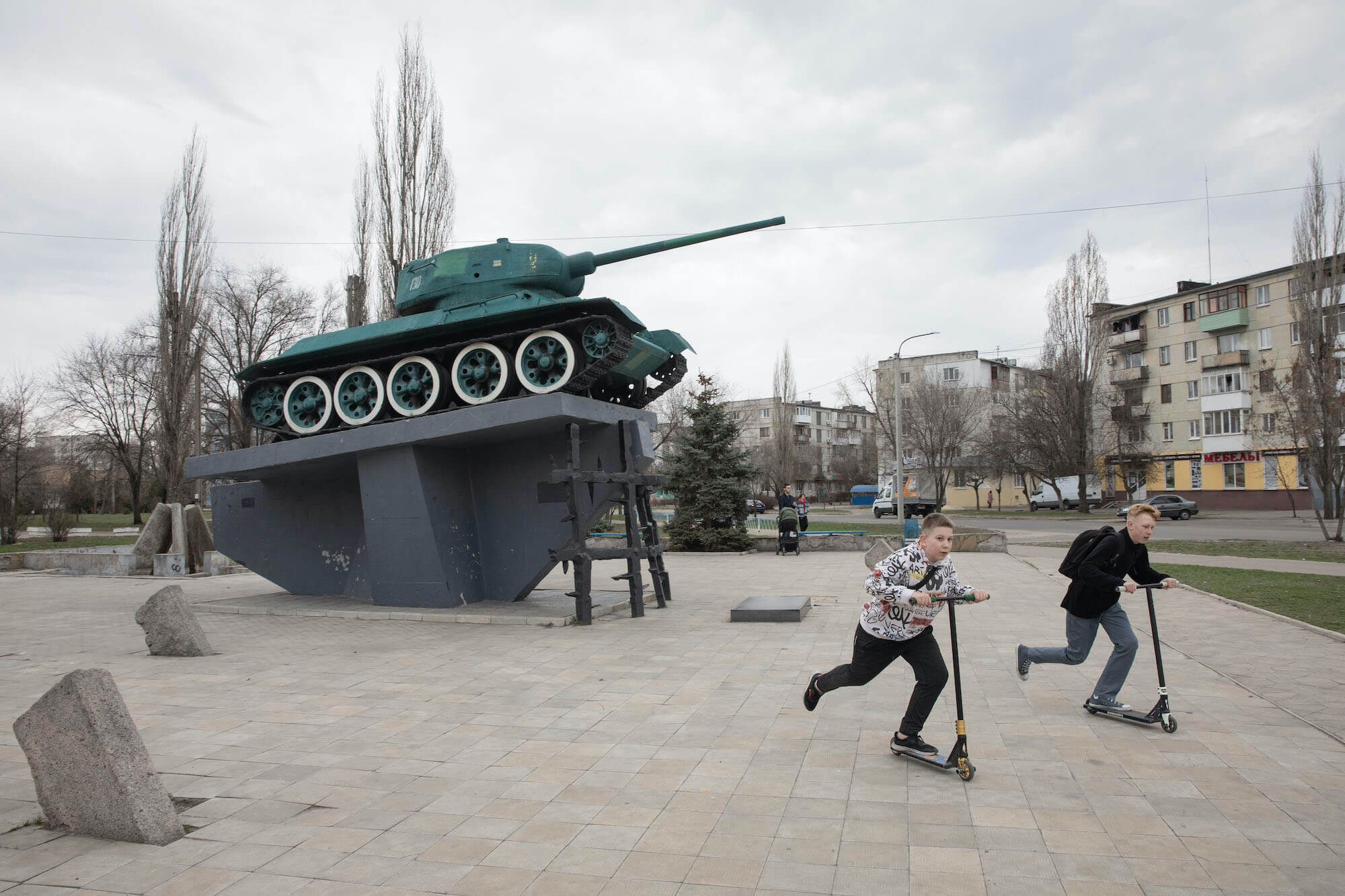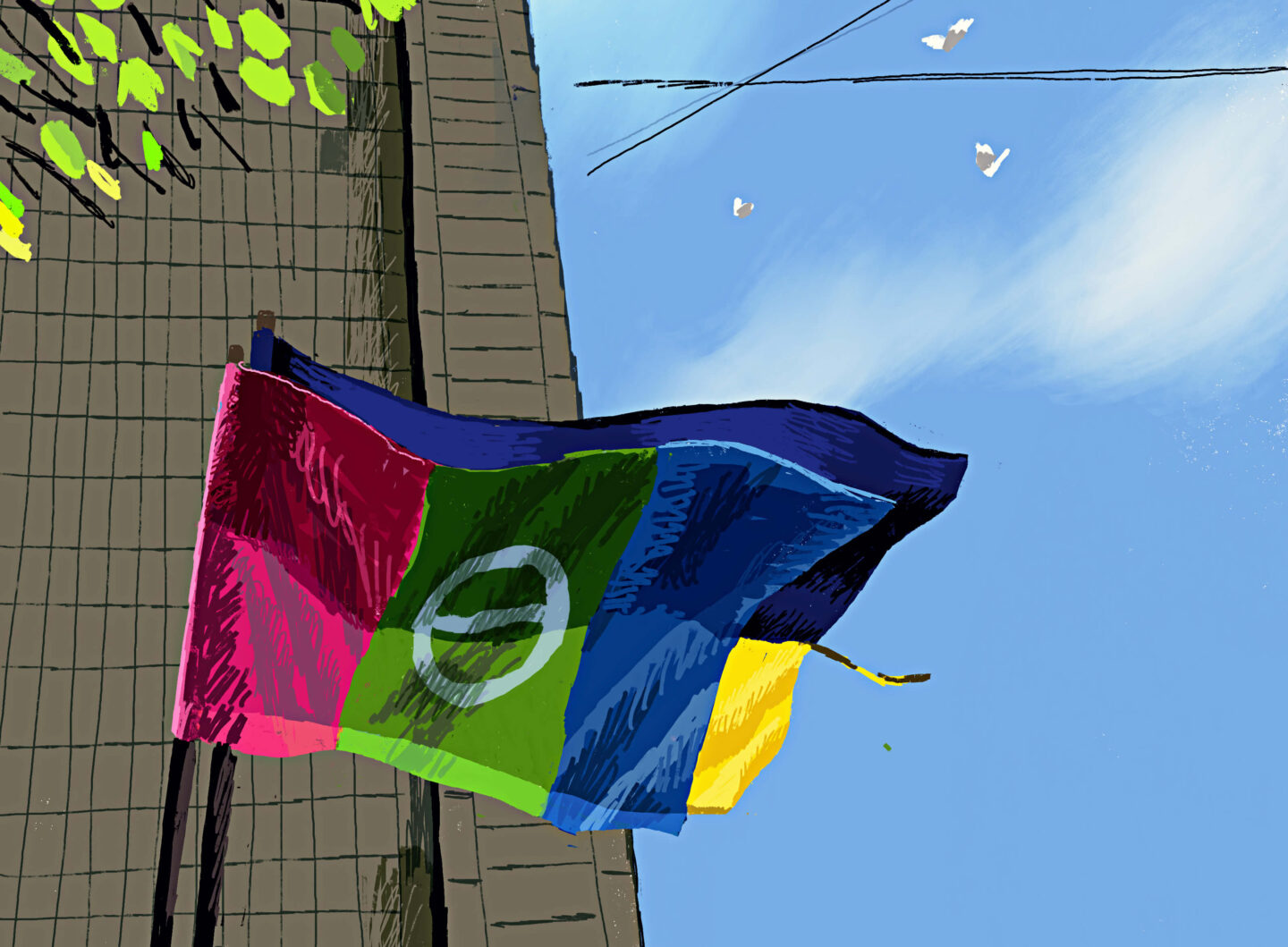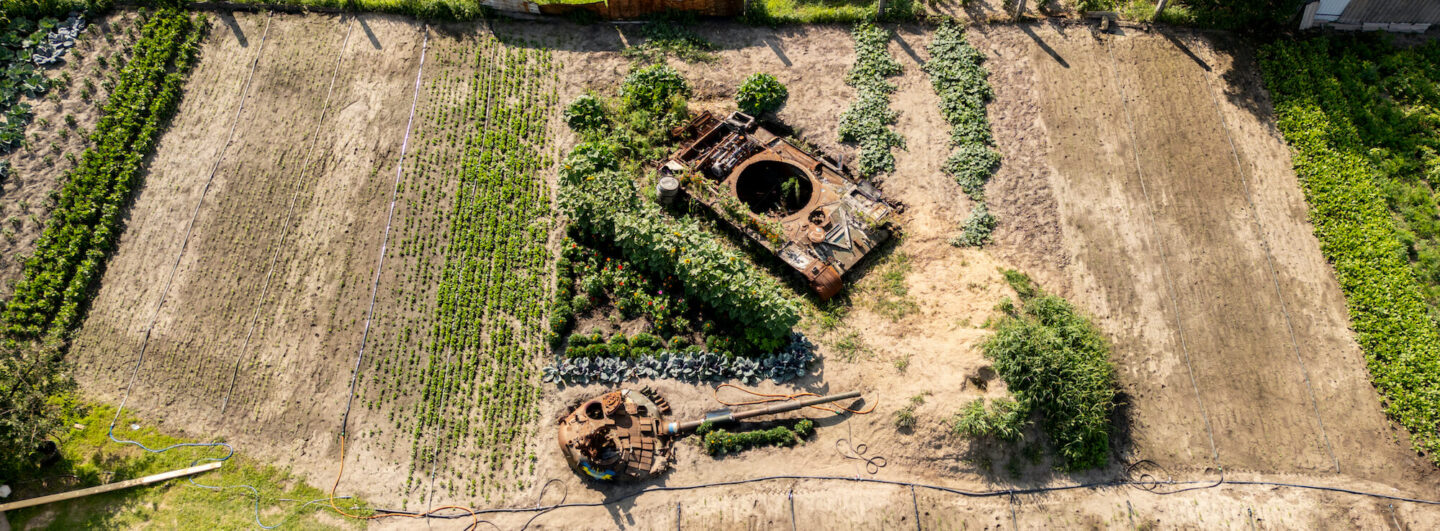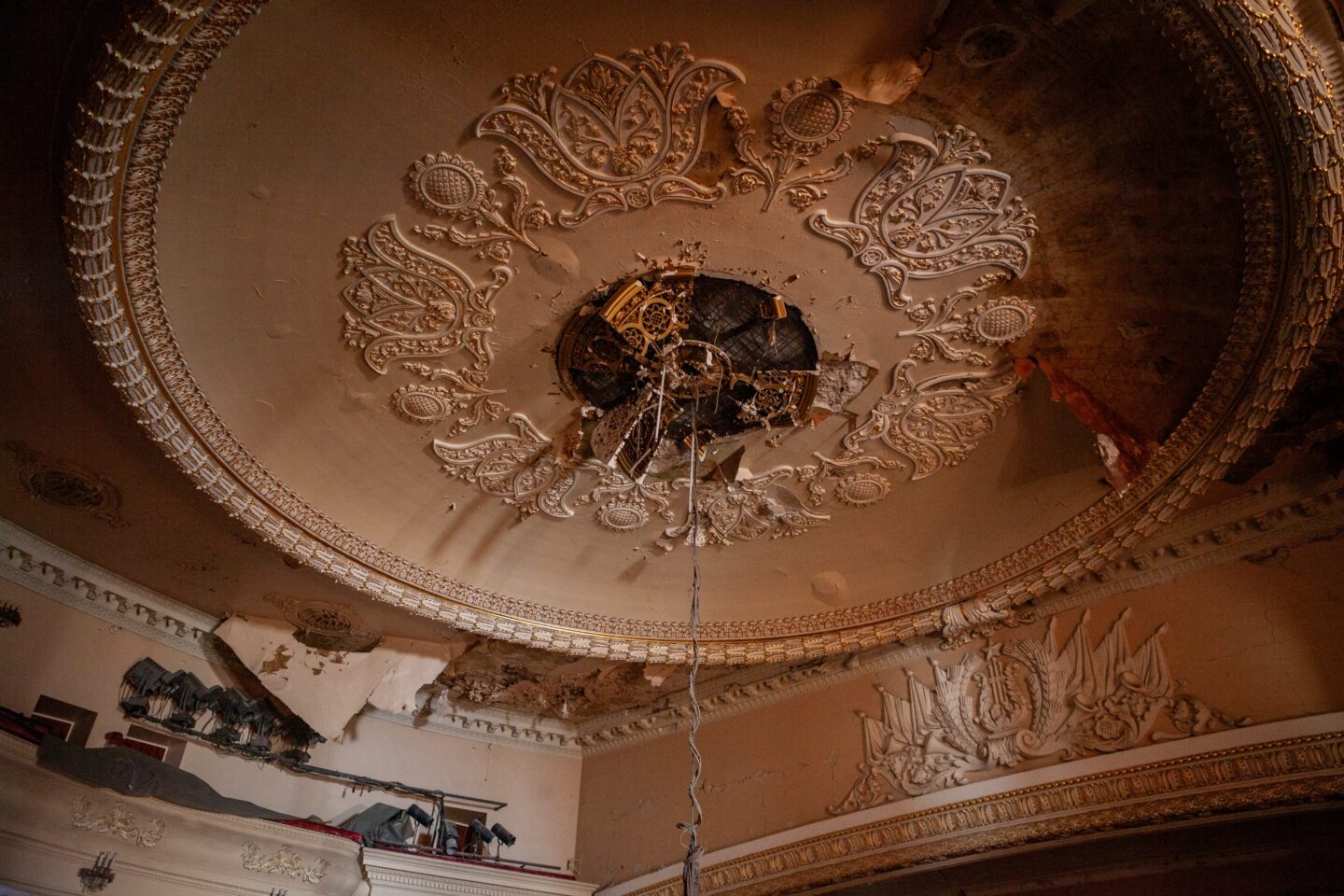“Whenever sociologists are being asked to describe how exactly did society change over the past decade, the first reaction is actually bafflement,” says Tymofii Brik, Rector of the Kyiv School of Economics. “That’s because sociologists study a myriad of parameters: from employment to mental health, from tobacco use to religious affiliation, from political views to pet ownership.” So, what criteria should be used for comparison?
In this joint project by Reporters and KSE, we’ve attempted to put together a collective image of Ukrainians. Taking into account sociological research, interviews of experts in various fields, and personal observations, the authors of the following pieces analyzed changes in Ukrainians over the past decade, that is, from 2014 to 2024. Changes in attitudes, values, preferences, ways to remember the past, and visions of building the future.
In the previous two parts, we reflected on the paradoxical combination of a lack of social trust and remarkable proactivity among Ukrainians, as well as analyzed projects dedicated to preserving culinary heritage. In the final piece, graduate students in the Memory and Public History Studies program will explore the balance between heroization, victimization, and dialogue about the past.
May 9, 2013. A stage decorated with a St. George’s ribbon under the Independence Monument. A crowded procession of the Communist Party and the Russian Bloc marches down Khreshchatyk Street.
November 6, 2013. Celebration of the 70th anniversary of the “liberation ” of Kyiv. A military-historical procession takes place on Khreshchatyk, featuring military equipment from WWII with inscriptions “For the Motherland! “. In the end, Cossacks dressed in sharovary and bearing sabers dance to music from an army orchestra.
Since the Brezhnev era, the cult of the “Great Victory ” has been one of the pillars of Soviet ideology. It survived the collapse of the USSR and has been preserved in independent Ukraine. This was successfully exploited by Russia and pro-Russian political forces inside the country.
Considering the aforementioned march, the changes that occurred in May 2014 certainly seem tectonic. It was with a change in approaches to celebrating the victory over Nazism that a large-scale turn in the national policy of commemoration began. Even then, even before the adoption of the decommunization laws, the country began to use the poppy symbol instead of the St. George ribbon. The emphasis shifted from the Russian-style “victory celebration ” to grief and remembrance. The European slogan “Never Again ” appeared in the official discourse, the term “liberation ” was replaced by “expulsion of the Nazis, ” and the “Great Patriotic War ” was replaced by “World War II. ” The chronological timeline was expanded from 1941 to 1939.
However, not everyone embraced these changes. For instance, the Soviet-inspired concert “Victory. One for All ” aired on the Inter TV channel in 2018. The changes spanned a decade: May 8, as the Day of Remembrance and Reconciliation, coexisted with May 9, the Day of Victory over Nazism. It was only in 2023 that Ukraine completely abandoned Victory Day on May 9 for the first time with the decision to celebrate the International Day of Europe. The explanatory note to the corresponding draft law states: “In order to restore historical truth and justice, Ukraine, as an integral part of the large European family, should celebrate the Day of Victory over Nazism in World War II of 1939-1945 together with the rest of Europe and the entire civilized democratic world on May 8. “
Moving towards European commemoration practices, Ukraine gradually expanded its own narrative of World War II, bringing to it groups of people who had been marginalized or erased from memory by the Soviet authorities: Soviet prisoners of war, Ostarbeiters, underground resistance fighters, children of war, and civilians who endured occupation and hostilities. Instead of faceless “Soviet citizens, ” the country began to speak more openly about Jews and Roma as victims of the Nazi extermination policy. Scholars and public organizations have made many efforts to humanize and inclusively commemorate World War II. At the same time, the example of Babyn Yar demonstrated the competition between public and private approaches to memorialization.
Among those not only returned to the official narrative but glorified by the authorities are soldiers of the Ukrainian Insurgent Army. They were legally recognized as fighters for Ukraine’s independence. Thus, there was a need to reconcile, in the same narrative, two adversarial parties: the insurgents and the Red Army. A symbolic expression of this was the invitation to official celebrations for veterans from both sides.
These gradual changes demonstrated the need to write a comprehensive history of Ukraine in World War II and to develop an appropriate language of remembrance. This process is still ongoing. A good example of it is the book Rokada. Four Essays on the History of World War II by historian Olena Stiazhkina.
At the same time, many uncomfortable stories have remained largely undiscussed. For example, the participation of Ukrainians from the Red Army in looting and other crimes during the “march across Europe. ” Or the collaboration with the Nazis and the crimes committed by the Ukrainian national movement. The Volyn tragedy also remains under-researched on the Ukrainian side and little known to the general public in Ukraine. It is mostly mentioned in connection with allegations made by Poland.
The overall trend in attitudes toward World War II in Ukraine is twofold. On the one hand, in response to Putin’s claim that “we would have won without Ukrainians, ” there is a strong emphasis on the tremendous losses and contribution of the Ukrainian people to the fight against Nazism, particularly as part of the Red Army. On the other hand, the memory of the Red Army is often perceived as part of Soviet propaganda that should be eliminated.
Decommunization is on the march
Kharkiv. A monument to Lenin on Freedom Square, the largest city square in the country. It sounds like an oxymoron, but that was the reality. After the Revolution of Dignity, the nation took a closer look at the names of our villages and cities and what fills their symbolic space.
The main promoter of decommunization was the Ukrainian Institute of National Remembrance (UINR), which was converted into a central executive agency. In 2015, the parliament passed a bundle of decommunization laws. They opened up access to the archives of Soviet state repression agencies, honored the fighters for independence, and mandated the removal of symbols of totalitarianism from public space. This would mean changing toponyms and dismantling some monuments, which sometimes caused conflicts between communities and the central government, as was the case with the renaming of Komsomolsk to Horishni Plavni and Kirovohrad to Kropyvnytskyi. For instance, in Kharkiv, the local authorities for years defended the existence of Zhukov Avenue and the monument to Zhukov.
According to the UINR, more than 50,000 toponyms were changed during the first years of decommunization, including almost a thousand towns and villages. More than two thousand monuments, commemorative plaques, etc., were dismantled. So, what was established instead? In some cases, the new street names were deliberately neutral, while in others, they closely resembled the former communist names.
As for monuments, a whole range of problems arose. Empty pedestals often remained in place of dismantled monuments – the authorities had no answer as to a way to fill this space. For years, there were no real solutions to controversial monumental installations or art objects. For example, the “Stone Embroideries ” in Nova Kakhovka, which are a legacy of the “Boychukists, ” but paradoxically were subject to decommunization because of the presence of hammer and sickle images in the ornaments. There is also a heated debate between the authorities, communities, and the artistic community about Soviet mosaics and architectural heritage generated after the 1960s.
A museum of Soviet monumental propaganda still hasn’t been created in Kyiv. Initially, there was talk of creating such a space at the Exhibition Center. Similar museums exist in other Central and Eastern European countries that have undergone decommunization. However, Kyiv’s dismantled monuments are temporarily stored in the storerooms of the State Aviation Museum simply because there is a lot of space there. Instead, museums and parks of Soviet propaganda were opened in the regions. To name a few, in the Spadshchansky Forest in the Sumy region, thanks to the efforts of the local nature conservancy, or in the village of Frumushyka Nova in the Odesa region, thanks to the support of local businesses.
It was difficult for the government to find alternative approaches and ways to redefine monuments. Instead, the artistic community was successful in this regard. One of the most apt re-designations for its time, the crack on the then Druzhby Narodiv Arch, was created by artist Volodymyr Kuznetsov. Or consider how, at the community’s initiative, artist Oleksandr Milov transformed the monument to Lenin in Odesa into the world’s first monument to Darth Vader.
Despite all the difficulties, in the course of decommunization, Ukraine got rid of dozens, if not hundreds, of cliché busts of Lenin and certainly no fewer street names in his honor. As well as many other Bolshevik branding markers.
However, breaking free from the Soviets is a much more complex process than renaming streets and demolishing monuments. As for monuments, it is not just about replacing one statue with another, it is about finding new forms of memorialization and aesthetics. This is a rejection of the Soviet perception of gender (congratulations to women on Spring Day and to all men on Defender’s Day). This is a rethinking of Ukrainians’ participation in Soviet expansions, such as the invasion of Czechoslovakia, Afghanistan (the propaganda label “internationalist soldiers ” has not completely gone out of use) and “special operations ” in Africa and Asia. This is the discontinuation of the term “Moldovan language, ” which took place in 2023. This is the restoration of trust in government institutions and a change in attitude towards the country, to be improved rather than defrauded. It is a proper respect for the historical heritage.
The Centennial of the Ukrainian Revolution
In 2023, Olesya Morgunets-Isaenko’s movie Shchedryk was released in Ukrainian theaters (Carol of the Bells in international release). Weaving through the plot is the melody of the composer Mykola Leontovych, known worldwide as Carol of the Bells. The story of the song “Shchedryk ” is both beautiful and tragic. The tragedy lies in the fact that Leontovych, who created the arrangement of the Ukrainian folk carol, was killed by a Soviet Chekist and did not see his work gain worldwide renown. Because “Shchedryk ” came to the West on a tour of the Oleksandr Koshytsia Choir, which took place simultaneously with the Ukrainians’ fight for their own country. These tours were a manifestation of cultural diplomacy, and Symon Petliura was keenly aware of its importance. However, the movement was defeated, and the adaptation of “Shchedryk ” became known as an American Christmas carol.
The story of “Shchedryk ” is one of those that have gained popularity amid growing awareness of the national liberation efforts of Ukrainians in the early 20th century. In 2017, Ukraine launched a series of nationwide commemorations of the centennial of the Ukrainian Revolution of 1917-1921. The goal of the information campaign was to neutralize the Soviet narrative of the civil war and show that for Ukraine, the turn of the 1910s and 1920s was a period of fight for statehood. Becoming a part of the Soviet Union was a result of the defeat of the Ukrainian People’s Republic in the war against the Bolsheviks.
It is unclear how widespread this view of the revolutionary events has become among Ukrainians. In 2023, the Kyiv International Institute of Sociology conducted a survey that indicated that the most famous historical person that Ukrainians view positively is Mykhailo Hrushevsky. 68% of respondents said that they consider the existence of the Ukrainian People’s Republic and the national liberation effort to be a positive influence in Ukrainian history. However, it is unclear whether this is due to the government’s policy of remembrance or some other factors.
Over this period, cultural content related to the national liberation efforts began to emerge in Ukraine. There are about a dozen feature films dedicated to individual historical figures, such as Symon Petliura, Petro Franko, or the rebel Black Raven of Kholodny Yar, as well as to certain events, such as the battle of Kruty. The audio album “Songs of the Ukrainian Revolution ” by the group “Chorea Kozatska, ” released on the initiative and with the support of the UINR, received the Shevchenko National Prize.
In her 2019 speech, the prominent scholar of historical memory Alaida Assmann noted that in national memory, “history is often carefully reduced to a respectable narrative ” that the state constructs “under the guidance of sentiments of national pride and honor. ” In such a narrative, the nation assumes one of three main roles: victor over evil, one who resisted evil, or a victim.
These trends can also be seen in the way the government constructs the narrative of the Ukrainian Revolution. It is easier to discuss the heroic struggle with the public than to explain why Ukrainian forces were defeated and how internal factors contributed to this defeat. It is easier and, in some ways, more natural to highlight those who can be hailed as heroes of the struggle for statehood than to take a closer look at the diverse society of Ukraine at the time.
The government adopted a similar approach to the Soviet period, talking about the past through the lens of confrontation with evil and victimization. The focus is on the crimes of the Soviet system and resistance to it: collectivization and peasant resistance, the Holodomor, repressions and the Great Terror, the liberation movement during World War II, the cultural emancipation of the Sixtiers, and dissidents’ non-violent opposition to the authorities. Discussing the responsibility of Ukrainians who participated in the Soviet Union project is difficult and unpleasant.
Another issue that has come to the forefront is whether being part of the Soviet Union should be considered a period of occupation. Over the course of 70 years, several generations of Ukrainians grew up in the Ukrainian SSR, so the experience of cooperation with the regime raises complicated questions.
From a legal point of view, in 1991 Ukraine proclaimed itself the successor to the Ukrainian Soviet Socialist Republic. At the same time, on August 22, 1992, the president of the Ukrainian People’s Republic in exile, Mykola Plavyuk, resigned from the State Center of the UPR at a solemn meeting of the Verkhovna Rada on the occasion of the first anniversary of independence and proclaimed Ukraine the successor to the Ukrainian People’s Republic. Two days later, the Center’s delegation handed over Hetman Mazepa’s insignia and other UPR official symbols to the Ukrainian authorities. After the Revolution of Dignity, at least in the writings and speeches of officials, and not only them, there was a claim that independence was restored in 1991. However, the law by which Ukraine proclaimed itself the successor to the Ukrainian SSR also remains in effect. The experience of Ukraine’s independence in the early 20th century was crucial for further state-building but too short to build a full-fledged continuity, as the Baltic states did after the collapse of the USSR. For them, it was that much easier to lead a full-blown canceling campaign on the Soviet era because they could rely on their own constitutions of the interwar period.
There is no consensus in society on whether to consider the Soviet period as an occupation. Are we ready to look at ourselves not only as victims of Soviet totalitarianism? What level of responsibility are we willing to take for participating in the Soviet Union project? Perhaps a decolonial lens can help us move forward on these issues.
The Holodomor: challenges of remembering a genocide
Over the past decade, at least six children’s books about the Holodomor of 1932-1933 have been published in Ukraine. Before that, such literature was hard to find on bookstore shelves. One of these books, The Coffer, by writer and fairy tale therapist Kateryna Yehorushkina, is intended for children aged 4 to 7. This is a sign that the tragedy of the Holodomor genocide has come out of oblivion and has become part of various cultural domains, including literature.
Recognizing the Holodomor of 1932-1933 as genocide and honoring the memory of Ukrainians massacred by starvation became part of the national policy of remembrance back under President Viktor Yushchenko. Several important things were accomplished then. The law “On the Holodomor of 1932-1933 in Ukraine ” was passed, recognizing this man-made famine as genocide at the state level. A memorial was opened in Kyiv. The Security Service of Ukraine opened a criminal case, which resulted in a court ruling that confirmed the genocidal nature of the Holodomor and found the leaders of the Soviet Union guilty of this crime.
However, under Yanukovych’s presidency, the remembrance of the Holodomor predictably disappeared from the public policy agenda.
The Revolution of Dignity brought changes to this issue, as well as to many other issues in the policy of memory. Since then, the recognition of the Holodomor as genocide within Ukrainian society and by the international community, as well as the commemoration of its victims, have been a part of Ukraine’s policy of remembrance. In ten years, the number of Ukrainians who consider the mass famine of 1932-1933 to be genocide of the Ukrainian people has increased by one-third, totaling 92% by the end of 2023.
A survey conducted in 2023 at the request of the Ukrainian Institute of National Remembrance showed that the majority of Ukrainians (more than 70%) annually or sometimes join in commemorating the Holodomor victims. Most often, people place a lit candle in a window on the evening of the fourth Saturday in November, the official day of remembrance in Ukraine. 59.7% of respondents said they had participated in the Candle in the Window campaign.
The tradition of placing a lit candle in a window in memory of the Ukrainians killed by man-made famine began as a grassroots initiative. The first such commemorative gesture was proposed by American Holodomor scholar James Mace in a column that appeared in the Kyiv newspaper Den in 2003. Eventually, it was adopted by the government.
Despite the fact that the topic of the Holodomor as genocide has made its way into public discourse, this does not mean that there are no more challenging and sensitive issues in relation to this topic.
First, there is still no fully functional museum. The second stage of the National Museum of the Holodomor Genocide, which should yield a complete museum building and, consequently, an exhibition, is still under construction.
Secondly, it would be fair to say that the Soviet genocide of Ukrainians has not been exhaustively researched. Consider the controversy over the number of victims of the Holodomor of 1932-1933 that erupted in 2021. The then-head of the National Holodomor Museum, Olesia Stasiuk, and a group of historians published a study in which they insisted on a figure of 10.5 million victims, while other researchers representing various scientific institutions in Ukraine and abroad considered this figure overestimated and deemed manipulating the methodology used in the museum’s study. This further demonstrated the need for further scientific research on the history of the Holodomor and the dissemination of knowledge in society that’s grounded in those results. A proper understanding that the fact of genocide is established through the intention and not through a staggering number of victims will allow us to move away from the rationale of “victim rivalry.”
Commemorative dates and calendar
A calendar is one of the tools of remembrance. That’s why it has been the subject of heated discussions since 2014.
The Revolution of Dignity and defiance of Russian military aggression became the foundation and catalyst for Ukraine’s modern civic identity. Ukrainians began to set aside certain dates to honor the heroes of the Heavenly Hundred, volunteers, and fallen defenders and to commemorate resistance to Russia’s annexation of Crimea.
Among the first steps in the reform of the Soviet holiday schedule was the introduction of Defender’s Day on October 14 to replace the Soviet version on February 23.
Some observances have become an indicator that national memory is moving toward inclusivity. Along with the days commemorating Ukrainian victims of Soviet totalitarianism, more attention has been paid to the dates associated with Stalin’s genocide of Crimean Tatars and the Holocaust.
Overall, some indigenous peoples, such as the Crimean Tatars, or national minorities, such as Jews or Poles, have become more visible in state memory policy. However, the voices of some other indigenous peoples (Karaites, Krymchaks) and ethnic groups (Roma, Gagauzes, and others) are still almost absent.
The International Women’s Day on March 8, which many Ukrainians perceive as a Soviet holiday, sparked a lot of debate. The intensity subsided a bit when the full-scale invasion resulted in the elimination of the extra days off. However, the excitement around the “spring holiday ” has not completely disappeared. However, the public was much more indifferent to the cancellation of Labor Day on May 1.
The full-scale phase of the war brought the issue of dates to the forefront in order to commemorate new events and honor new victims and heroes.
Distancing from the legacy of the Russian Empire
Despite the abundance of changes over the past decade, we have not had time to thoroughly study the Soviet past and complete projects related to the memorialization of the Revolution of Dignity. The full-scale war has posed new challenges.
Society called for a distancing not only from the Soviet Union but also from everything Russian, including the legacy of the Russian Empire. The government responded to this demand in a familiar way: by renaming streets, dismantling monuments, and passing a new law prohibiting “symbols of Russian imperial policy. ” However, developing criteria for what exactly constitutes such symbols proved more difficult than in the case of decommunization. Therefore, a separate expert council was set up at the UINR.
Then again, decolonization raises an even more complex set of issues than decommunization. It requires the development of new perspectives and language, not just the rejection of the imperial narrative.
At the same time, Ukrainians are faced with the task of documenting and preserving the memory of the war and creating appropriate memorial spaces, traditions, and language of remembrance. And this has to be done “here and now, ” and not from a temporal distance to the traumatic events, as was the case before. Moreover, when dealing with the war in our own country, we see that previous approaches to remembrance and historical justice have not worked out completely. The response to these complex challenges may also determine how Ukrainian society will emerge from this war.
Translation — Marichka Androshchuk
§§§
[The translation of this publication was compiled with the support of the European Union and the International Renaissance Foundation within the framework “European Renaissance of Ukraine” project. Its content is the exclusive responsibility of the authors and does not necessarily reflect the views of the European Union and the International Renaissance Foundation]





